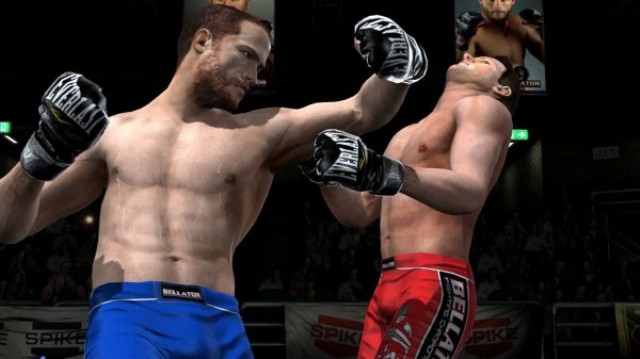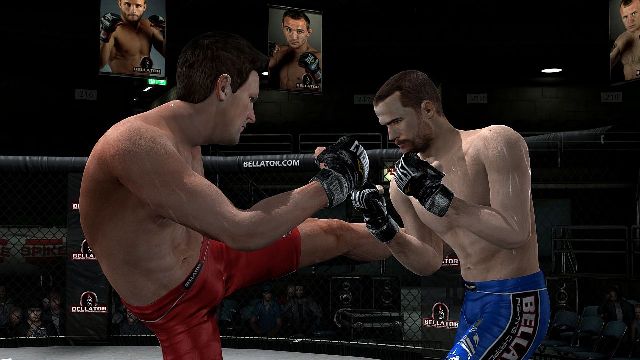E3 Preview: What’s a Bellator and why is it so fun?
Have you ever had a friend that just doesn’t seem to get it? No matter how many times he’s informed that you’re just not into a band, a sport or some other such thing he just keeps on dragging you out to experience it. He can only be denied so many times before you reach the end of your Seinfeldian Excuse Rolodex and bite the bullet. So it is with MMA and one of my closest friends. Despite maintaining a serious passion for a number of sports, MMA excites me about as much as the prospect of playing Superman 64.
It’s of little surprise, then, that enthusiasm was low while trekking across the convention hall en route for an appointment to play 345 Games’ Bellator: MMA Onslaught. The nice folks at 345 ran through a quick overview of their fighting game and demoed a match in the blissfully peaceful office off the show floor. John noted how much better the visuals were than the last time he had seen the game. Then Matt McEnerney, senior producer at 345, and company showed off the game’s surprisingly deep RPG elements — character creation and progression. Once they were done tinkering, the fight was on. The more of the game that was shown, the more I suddenly found myself eager to give a try.
Finally holding the controller and alternating between squaring off with John and Todd, there was only one thought bouncing around in the old noggin: this is fun. So much fun, in fact, that I failed to realize the victory during one round was attributed almost entirely to the fact that John was asking the 345 team questions while randomly and halfheartedly pressing buttons on the PS3 controller during the final moments of a fight. Here’s to small victories.
Bellator operates on a system in which fighters have a stamina bar underneath of their health bars. Players can punch, kick and throw — don’t look for technical MMA terms in this preview, you won’t find them — their opponent to their heart’s content while whittling down a substantial portion of his health and still come away with a loss. That’s because performing such actions will cause them to become fatigued and thus more susceptible to attacks and pins. To make it easier for players to keep track of when their fighter is about to become worn out — and because, let’s face it, everyone loves Super Nintendo boss fights — characters start flashing when they are in danger of hitting the wall.
In order to pin a rival fighter combatants must emerge victorious from a button-mashing fest, the results of which are heavily influenced by how tired out each fighter is. It adds an interesting layer of strategy to matches, forcing players to do more than spam their strongest attacks until victory is achieved. Todd took a more reserved approach to the game and it served him quite well. By storing up enough stamina, he was able to unleash it in the form of some wicked knees to the rib cage to wear down John’s fighter further before pinning him and walking away the winner.
Onslaught of course has a roster of actual MMA fighters, each of them possessing different attributes and fighting styles based directly upon their real-world counterparts. It’s also possible to create a character from scratch, though. All of the usual aesthetic options are present (345 demonstrated by creating a bald black fighter with a blue beard and matching chest hair), though it doesn’t get quite as granular as some games with the feature do. The developers purposely omitted such exciting features as the ability to move a nose one-fourth of an inch one way or the other. Bummer. That being said, they expressed an openness to adding in such functionality through post-release updates should the fans show sufficient demand for it and support for the game.
Character creation also comes with the ability to mess around with the type of fighter being molded. A handful of fighting elements can be invested into in order to make a character that appeals to your preferred style of fighting. These attributes can then be leveled up through fights. As a nice little bonus, any character created in the game’s forthcoming XBLA demo can be carried right on over to the full game once purchased. It’s 345’s way of trying to hook players in, and it just may work.



